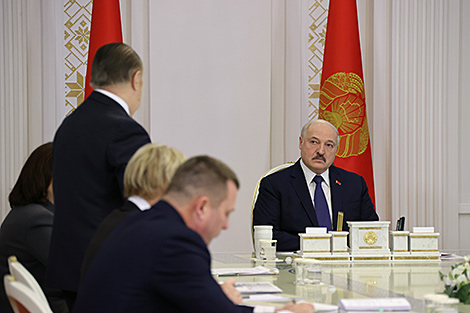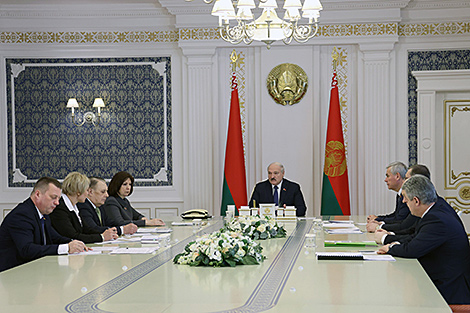Events
Community leaders might have a say in appealing Supreme Court decisions

MINSK, 11 February (BelTA) – In line with a new bill, verdicts of the Supreme Court can be challenged on appeal by a special commission that might include not only judges, but also members of the public. The bill was discussed at the meeting hosted by Belarusian President Aleksandr Lukashenko on 11 February. Chairman of the Supreme Court Valentin Sukalo told the media about the details of the discussion, BelTA has learned.
He explained that the institution of appeal had already been introduced at nearly all levels of the judicial system and it is already possible to appeal against a verdict before it comes into force. At the same time, the Supreme Court decisions cannot be challenged, they come into force after they are announced.
Therefore, the new bill provides for a possibility to file appeals and lodge protests against first instance decisions of the Supreme Court. The bill suggests creating a special board of appeal in the Supreme Court to consider such complaints and protests. This board is proposed to be made up of judges approved by the plenum of the Supreme Court following an order of the chairman of the court.
After hearing this proposal, the president asked the chairman of the Supreme Court whether he thinks this bill will go down well with the public, because people might reasonably ask: how come, the Supreme Court is going to review itself?
“No, it is not. A special board will be put together to consider appeal cases. This will be done by special judges, the most experienced ones, members of the Presidium of the Supreme Court, who are not connected with the consideration of the case in the first instance of the Supreme Court,” Valentin Sukalo explained.

“Yet, people might say: one hand washes the other,” Aleksandr Lukashenko objected.
“It is simply impossible to foresee another structure (provided the Supreme Court has such competence), it does not exist. Therefore, this is the most effective structure, this is not something we have devised, supreme courts of some other CIS countries are entitled to consider cases at first instance,” Valentin Sukalo said.
The participants of the meeting voiced various points of view and came to the conclusion that this bill should be fine-tuned. “The stumbling block of the discussion was the composition of a judicial authority that can review the Supreme Court decisions on appeal. Maybe we need to expand the composition of this board to include more representatives of the public. Such a possibility was discussed. By and large, the bill was supported by the head of state and after some fine-tuning it can be submitted to the parliament,” Valentin Sukalo said.
Prosecutor General Andrei Shved told reporters after the meeting that the head of state set a task to give the public a bigger role in the judicial process. “We will think of the ways to engage honest, decent people in reviewing the lawfulness of decisions taken by the court along with judges,” he said.
According to him, it is necessary to invite opinion leaders to take part in this process. “Their very involvement will highlight the impartiality and objectivity of justice and further strengthen the public trust in our judicial system (although it is quite high now),” the prosecutor general emphasized. “This is a serious step towards improving the judicial system and ensuring the rule of law,” he added.







 print version
print version make home page
make home page add to bookmarks
add to bookmarks

